Due to the occupation of their hometown, the staff of the influential Kherson independent newspaper Novyi Den was forced to leave Kherson and move to the regions controlled by the legitimate government of Ukraine. Today, the newspaper’s journalists live in different regions, but thanks to the support of the NUJU and international donors, they continue to work together, maintaining a Facebook page, a Telegram channel, an Internet site, and, after the liberation of Kherson, revived the paper newspaper. Support from the Swiss non-profit organization Fondation Hirondelle and the US Embassy in Ukraine currently ensure the economic stability of Novyi Den.
“After the city was occupied, we stayed in Kherson for a month, until March 21, 2022. Of course, it was impossible to publish a paper newspaper, but we continued to fill the website,” says Anatoliy Zhupyna, editor-in-chief of Novyi Den, “The support of colleagues helped a lot: on the first day of the invasion, the President of the National Union of Journalists, Sergiy Tomilenko, called me, and we constantly consulted with him about whether to continue our work and in what form.”
In the first days of the occupation, most of the Novyi Den staff worked remotely, posting information on the website. They wrote about the outbreak of a full-scale war, the seizure of the Kherson region, and the battles for the Antonivskyi Bridge… Later, problems began to arise with the site, and the editorial staff thought that it was dangerous to continue working. On March 12, 2022, the occupiers abducted Oleg Baturin, a journalist from Kakhovka and employee of Novyi Den, and held him captive until March 20.
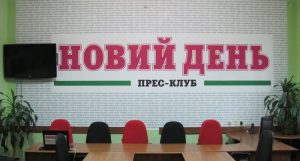
“While Oleg was in captivity, we tried to do everything possible to free him. However, the situation was getting more and more complicated. The occupiers started coming to my work and home. So on March 21, after consulting with the leadership of the NUJU, we packed our things and drove towards Mykolayiv,” says Anatoliy Volodymyrovych.
The journalists from Novyi Den like other Ukrainians, who had to leave the occupied territories, had a difficult time getting to the free territory. It was no longer possible to drive to Mykolayiv on the highway, so they took a detour through the villages. They had to overcome 7-8 Russian checkpoints, and the occupiers conducted a thorough inspection of cars and bags at each one. Previously, it took about an hour to get to Mykolayiv, but this time it took 8 hours. On the border with Mykolayiv region, they had to cross the dam at full speed, which was being shelled by the occupiers…
Following the editor and his family, most of the other employees of the newspaper left Kherson. Many of them now live in Lviv.
“The Lviv Journalists’ Solidarity Center provided us with equipment for our work,” says Anatoliy Zhupyna, “In addition, thanks to the assistance of the NUJU and the Academy of Ukrainian Press, international donors have provided us with funds for 3 months to pay journalists’ salaries.”
As the editorial board explains, the assistance of international donors is of paramount importance – both for journalists who left the Kherson region and for those who stayed there for some time. Because while those in the government-controlled territories can still find a job in local publications or even change their profession, contributors from the occupied territories often have no legal way to earn money other than to write for Ukrainian publications and receive payment (in various ways) for this.

Maryna Savchenko, a journalist for Novyi Den and a correspondent for the national TV channel 24, was under occupation until mid-June 2022. Before that, she tried to leave several times, but the Russians turned the convoys of cars around and sent them back to Kherson. Maryna says that she has experienced firsthand what it is like not to be able to earn money. Therefore, she is very grateful to her colleagues for their support.
“I have been a member of the National Union of Journalists since 2006. Back then, in peaceful and calm times, in Kherson, the activities of the NUJU, like those of other trade unions, were somewhat formal: we celebrated holidays, participated in competitions…” Maryna Savchenko recalls. “Today everything is different. The Union has really helped me a lot! When I was under occupation, the Union sent me a significant amount of money, which, to be honest, just helped me survive. It’s great when there is a corporate spirit, corporate support – not only from the editorial staff and its head Anatoliy Zhupyna, but also from the Union of Journalists. Colleagues and the management of the editorial office could have just thrown up their hands: sorry, there is nothing we can do in the conditions of war. Nevertheless, they did not abandon us! I think this kind of journalism can be called sacrificial.”
Meanwhile, a part of the editorial staff located in the free territories tried to resume their work with the support of the Journalists’ Solidarity Center of the NUJU.
“At first, we did not understand how to act in the new realities,” Oksana Pavlenko, deputy editor-in-chief, told the NUJU, “We had to completely rebuild all our activities, switch from a paper newspaper to a website and work in social networks. Moreover, we were not ready for this even technically. The Lviv Journalists’ Solidarity Center of the NUJU helped us a lot.”
On May 12, 2022, the updated edition was re-launched for readers. Novyi Day began publishing in the format of the NewDay ua Facebook page and Telegram channel, and in mid-September, the editorial office launched a new website.
After Kherson was liberated on November 11, 2022, it was the turn of the paper newspaper.
“When our Defense Forces liberated Kherson, we wanted to be useful to our fellow citizens in the new conditions. It became clear that since there was no electricity and no stable connection in the city, our online posts were not reaching them,” says deputy editor-in-chief Lyudmyla Zhupyna, “Although our audience is all over the world, the most important thing for us is to provide information to Kherson residents.”
The editorial staff asked for help from the National Union of Journalists of Ukraine, which provided funds from foreign benefactors, and from colleagues in the Lviv newspaper Vysokyi Zamok, who designed and printed the issue. Thus, on November 17, the first issue after the de-occupation was published, and it became a historic one. Since then, Novyi Den has been published in paper format every month. While a large part of the region has not yet been liberated, it is not possible to send the newspaper to subscribers, and local communities distribute it in the de-occupied territories. The editorial staff continues to work remotely: Kherson is constantly under fire.

“We do our best for our fellow citizens. In addition to the liberated areas of Kherson region, we send copies to Kherson hubs in Odesa, Lviv, Ivano-Frankivsk, and Kryvyi Rih,” says Anatoliy Zhupyna, “We are happy that the number of readers in Kherson region has increased in recent months: people are returning to the villages that are farthest from the front line. Life is slowly reviving. The President (of Ukraine – Editor) has visited twice in less than six months. All this inspires faith and confidence that everything will be fine.”
According to Anatoliy Zhupyna, the Novyi Den newspaper has survived and is able to reach its readers only thanks to the help of benefactors – the NUJU and foreign financial donors.
“We are very grateful to the Union and its chairman, Sergiy Tomilenko, who helped us find support, to the Institute for Regional Media and Information (IRMI), and to the Academy of Ukrainian Press. Only thanks to their substantial assistance we can publish a newspaper today and employ 7 journalists,” Anatoliy Zhupyna emphasized, “It was an extremely reasonable decision to create the NUJU Journalists’ Solidarity Centers largely thanks to which we survived as a publication.”

This story about the media was created by the NUJU in the frame of the project «Improving Ukrainian Media Resilience in Ukraine», financed by Swiss Solidarity and implemented with the support of the Swiss non-profit organization Fondation Hirondelle and the Institute for Regional Media and Information (IRMI, Ukraine). Fondation Hirondelle and IRMI implement a project of institutional support for Ukrainian media editorial offices in the east, north and south of our country, with an emphasis on the local press. They also launched a 10-month support program for 18 media.
Economic reference
Novyi Den newspaper
Distribution area: Kherson Region
Editor-in-chief: Zhupyna Anatoliy Volodymyrovych
- From February 24 to November 16, 2022, the newspaper was not published due to the occupation. Since November 2022, the newspaper has been published once a month; before the war, it was a weekly. The publication has reduced its volume from 20-24 pages to 8.
- Currently, the newspaper is distributed in the de-occupied territory of Kherson region and in Kherson hubs in Kryvyi Rih, Vinnytsia, Ivano-Frankivsk, Lviv, and Kyiv.
- The average circulation of one issue in March 2023 is 10,000 copies.
- Currently, 100% of the circulation is distributed free of charge through volunteers, local community leaders, and military administrations.
- The publication is functioning by grants. Support from the Swiss non-profit organization Fondation Hirondelle and the US Embassy in Ukraine currently ensure the economic stability of Novyi Den.
- During the war, the media halved the number of staff. Currently, there are 8 full-time and 3 part-time employees. The editorial office has been completely relocated, and all employees are now working remotely in different regions. Most of the team is based in Lviv. Therefore, since November 17, 2022, Novyi Den has been published in Lviv at the Vysokyi Zamok Publishing House.
- The premises of the editorial office have been partially preserved, but require significant investment to ensure their full functioning.
- Salaries are paid to the editorial staff on a regular basis after donor funding is received.
- In addition to the print version, the media outlet distributes its content on its website and through its Facebook and Telegram pages.

 THE NATIONAL UNION OF
JOURNALISTS OF UKRAINE
THE NATIONAL UNION OF
JOURNALISTS OF UKRAINE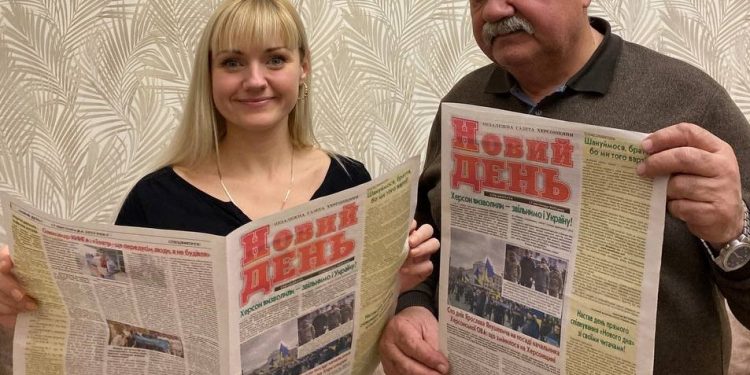
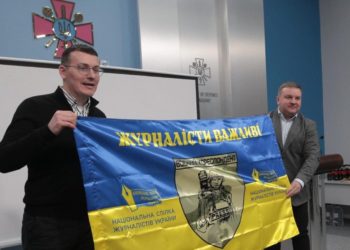
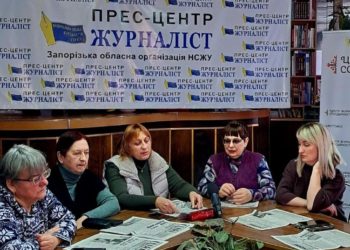
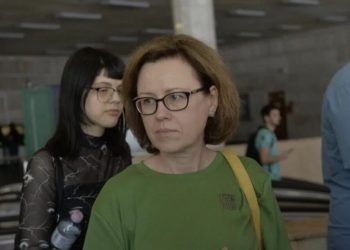













Discussion about this post